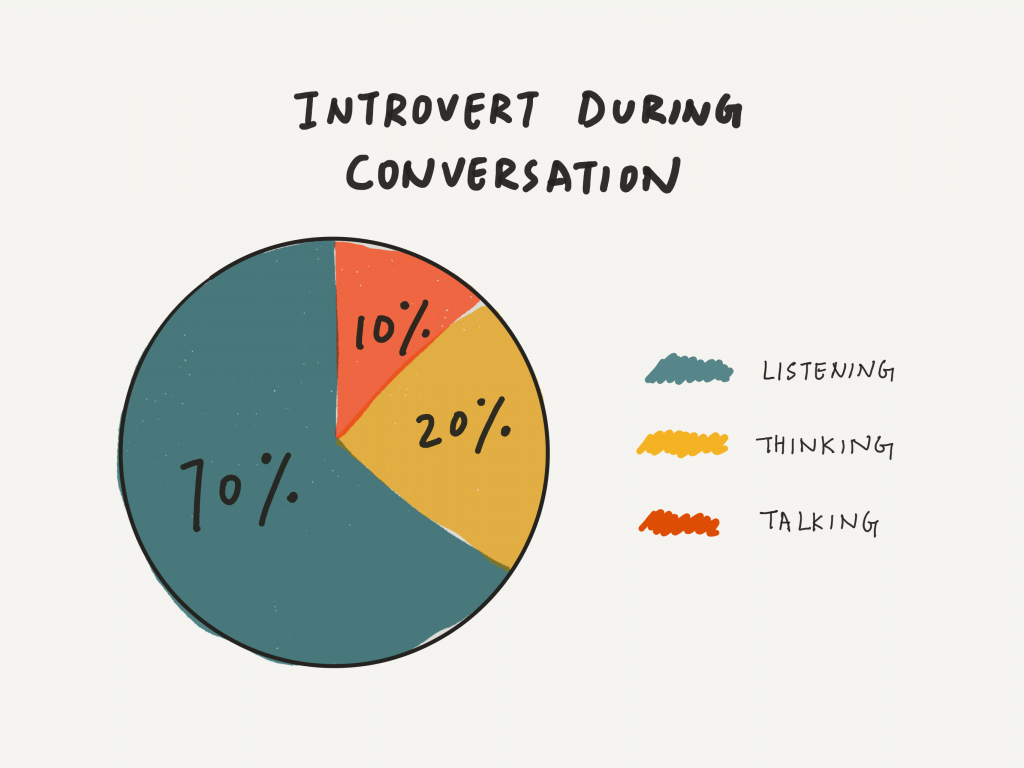8 Signs Of A True Introvert


An introvert is a person who prefers to spend time alone, rather than in social settings and activities. Most introverts (especially in books and the media) are portrayed to be shy, awkward, and reserved anti-socials. The introversion and extroversion personality orientations were first created by psychologist Carl Jung in the early 1900s. These two character types are frequently used to categorize and establish a common understanding between the essential differences of being outgoing and reserved. Extroverts are more outspoken and get energy from interacting with other people, whereas introverts feel drained when in social settings and favor keeping to themselves. Introversion and extroversion lie on a vast spectrum. While there are various traits specific to introverted people, here are a few distinctive attributes which all true introverts can relate to.
1. They Are Observant
Introverts tend to be excellent observers. They are always the first ones to notice anything from a new haircut or outfit, to a difference in body language or facial expressions. Introverts utilize this exceptional skill to “read the room” and truly gain an understanding of the energies others may bring into a space. Unlike their extroverted peers, introverts often learn things through careful observation rather than impulsive execution. This quality really helps them develop a heightened sense of their surroundings and the people within it. While they are typically identified as the quiet ones in the room, introverts are actually soaking in their environment in order to establish strong interpersonal communication.
2. They Are Great Listeners
Introverts are especially skilled at active listening. Dr. Laurie Helgoe, author of Introvert Power: Why Your Hidden Life Is Your Hidden Strength, states that introverts process information internally and that skill “allows them to hear, understand, and provide carefully considered insight when they do respond.” Introverts tend to be the best ones to go to for a good vent. They have the ability to set aside their personal thoughts and feelings in order to respectfully allow one to process and reflect on their own. They establish trust and transparency through attentive listening, instead of the more interactive listening that extroverts are known to participate in. So the next time you want to get something off your chest, you can be sure to count on your introverted friend or family member to be there for you, no matter how trivial the issue may be.

3. They Are Highly Introspective
Another great quality of a true introvert is their remarkable introspection. You may notice how the words “introspection” and “introvert” both contain the word “intro”. According to the Merriam-Webster dictionary, “intro” means inward or within, which certainly confirms the theme here. Introverts have a very active internal monologue and are true masters at the art of introspective thinking. An introvert’s curiosity and reflective attitude helps them carefully devise plans and solutions in their minds before putting them into action. This contemplative thinking allows them to keep in touch with their authenticity through closely monitoring their thoughts, feelings, and emotions.
4. They Think Before They Speak
Introverts like to feel prepared before executing any plan of action- including a conversation. A true introvert feels the need to rehearse and more carefully formulate approaches and responses to conversations. They think before they speak and thus choose their words wisely, especially to avoid miscommunications and misunderstandings. They also appreciate writing over talking, so a majority of introverts can admit to feeling far more comfortable texting or writing an email, rather than communicating over calls or in-person. This quality can, however, be a hindrance when in fast-paced professional settings where there is not enough time to pause, think, and then react. But the advantage is that it allows introverts to establish solid communication skills.

5. They Are Creative
Introverts are extraordinarily creative, almost always tapping into their abstract reasoning, unique perspectives, and “out of the box” thinking. Because of their introspective and curious minds, introverts are constantly looking for solutions to problems and finding creative approaches to do so. When social settings drain the introverted soul, introverts typically resort to a creative outlet to regain their energy and fuel up in their own way. After a long day at school or work, introverts look forward to spending some time engaging in their favorite hobbies- whether that may be cooking something delicious, playing music, writing in a journal, or indulging in self care.

6. They Experience Emotions Intensely
Most introverts are very aware and in touch with their feelings, and the feelings of the people they interact with. Almost “too” aware. This level of sensitivity can have both positive and negative impacts, with one of the negatives including the fact that this can lead to mental health issues. In fact, a study conducted by the United States National Center for Biotechnology Information (USNCBI), shows that introverts are more likely to develop depression due to having “introversion acts in concert with personality variables, including neuroticism and… a feeling-type personality”. Introverts, especially when experiencing high stress levels, can absorb and internalize external feelings and often misidentify them as their own. Although this serves as an inconvenience at times, the ability to feel for others so deeply is what gives them such a commendable amount of empathy for their peers.
7. They Are Thoughtful Networkers
Since it is more of an occasion for any introvert to go to social gatherings, they make it a point to make every interaction meaningful and of value. Networking for an introvert is viewed through quality, rather than quantity. Unlike extroverts, who use their unreserved personalities to make as many connections as possible, introverts use every opportunity to make a good first impression. They like to approach new interactions with new people with caution and care in order to create a secure foundation before making further connections.

8. They Make Excellent Leaders
With all of these distinctive qualities, one of the most exceptional qualities of an introvert is their good-natured, compassionate leadership skills. Introverts can make some of the best leaders and role models. Take Rosa Parks, Mahatma Gandhi, Barack Obama, and Albert Einstein for example. These are just a few of the many people that have had a great impact on the world- all achieved with the help of their distinctive introverted qualities. Being mindful communicators, amazing listeners, and observant and introspective people give introverts the ideal characteristics to successfully carry and coach a team of players.
So although introverts are commonly viewed as “overly” independent and distant anti-socials, they are often some of the most admirable individuals due to their unique attributes. Their heightened self-awareness, reflective attitude, thoughtfulness, and cautious navigation through society are true gifts which give them an outstanding level of empathy and compassion. Perhaps we should all learn something from our introverted friends, and practice being more mindful through the simplicity of taking a moment to pause, think, and reflect.
References
- Breit, C. (2018, August 27). The Surprising Benefits of Being an Introvert. Time. Retrieved February 4, 2021, from https://time.com/5373403/surprising-benefits-introvert/
- Holland, K. (2018, July 31). Are You an Introvert? Here’s How to Tell (T. J. Legg, Ph.D., CRNP, Ed.). Healthline. Retrieved February 4, 2021, from https://www.healthline.com/health/what-is-an-introvert#Personality-traits-of-an-introvert-
- It’s Always the Quiet Ones… Famous Introverts in History. (n.d.). The Children’s Trust. Retrieved February 4, 2021, from https://www.thechildrenstrust.org/content/it%E2%80%99s-always-quiet-ones%E2%80%A6-famous-introverts-history
- Janowsky D. S. (2001). Introversion and extroversion: implications for depression and suicidality. Current psychiatry reports, 3(6), 444–450. https://doi.org/10.1007/s11920-001-0037-7
- Sword, L. (2002). The Gifted Introvert. High Ability. Retrieved February 4, 2021, from https://highability.org/the-gifted-introvert/
- Wallen, D. (n.d.). 10 Quality Traits All Introverts Have, Even If They Don’t Know It. Lifehack. Retrieved February 4, 2021, from https://www.lifehack.org/articles/communication/10-quality-traits-all-introverts-have-even-they-dont-know-2.html




Well written and explained for a common man. Easy english and language flow.
Keep going and looking forward to many more write up!!!
Explained in a very simple and concise manner. Got some new insights today. 🙂
Good writing Aditi! Interesting explanation. I guess this personality trait exists in all of us, in varying degrees perhaps. I guess there is a normal for each individual between being introverted versus extroverted, and we do swing to the right or to the left on that scale depending on situations we face on a daily basis.